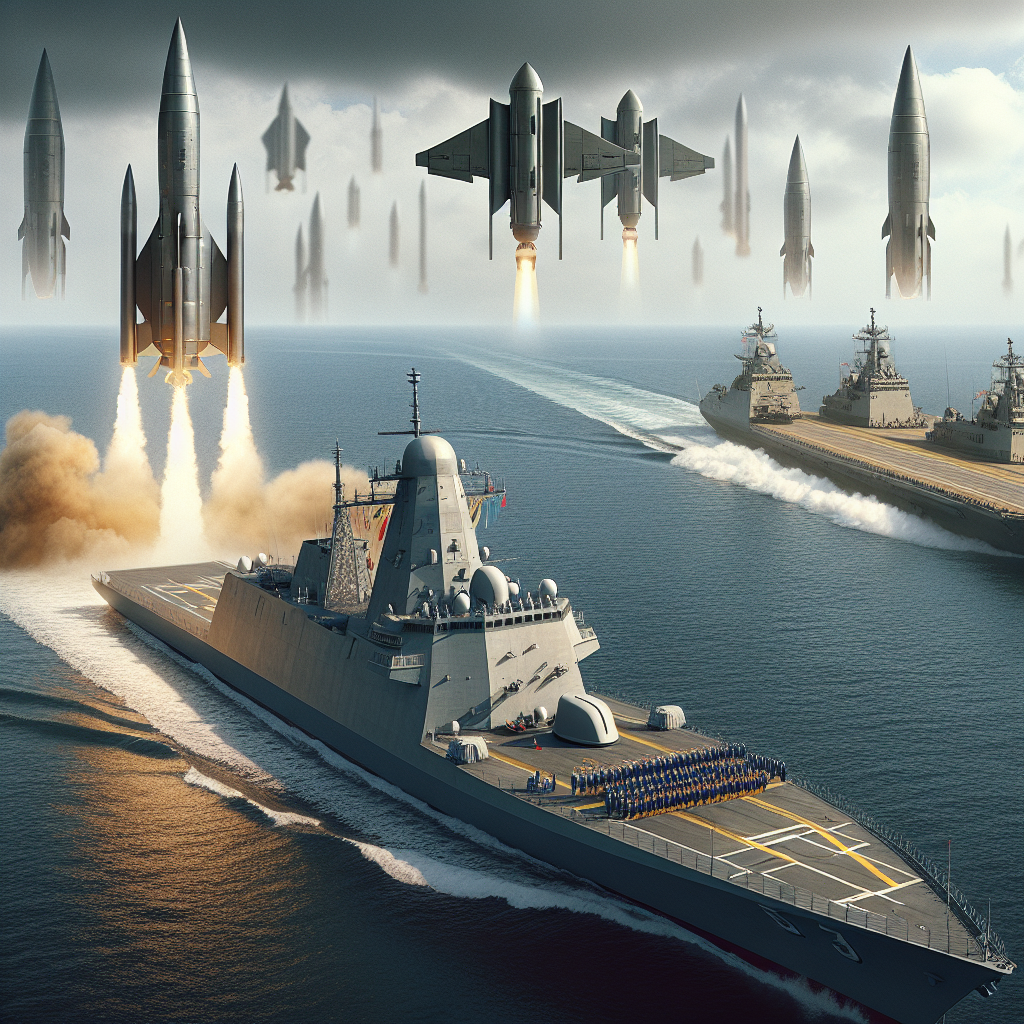North Korea’s Missile Launch Sparks Global Attention: An Analysis of the Naval Test
Introduction: A Spotlight on North Korea’s Naval Aspirations
North Korea once again captured global headlines with its recent missile test-firings from a newly commissioned destroyer. Kim Jong Un’s direct involvement in overseeing the launch underscores Pyongyang’s intent to solidify its naval prowess and bolster nuclear attack capabilities. But what does this move signify for the region, and how could it reshape the global security landscape? This article delves deep into North Korea's latest military advancement, its geopolitical implications, and the challenges it poses to international diplomacy.
A New Chapter in North Korea’s Military Strategy
North Korea's naval ambitions are not new, but the latest missile test from its freshly launched destroyer reflects a critical shift in its strategy. The country has relied mainly on its land-based missile systems for decades. However, this transition towards enhancing its naval nuclear strike potential indicates an expansion of its deterrence capabilities.
Unveiled Destroyer: A Symbol of Aggression
The destroyer in question, which reportedly features advanced missile-launching capabilities, marks a milestone in North Korea’s naval aspirations. Kim Jong Un’s statement about the “indispensable role” of nuclear-armed vessels highlights the regime's focus on diversifying its strategic weapons delivery mechanisms. This move is widely seen as an effort to counterbalance the heavy U.S. naval presence in the Pacific.
Related article: North Korea's Expanding Military Arsenal
Implications for Regional Powers
The missile tests have alarmed neighboring countries, including South Korea and Japan, who view these developments as a direct threat. Both nations scrambled to enhance their missile defense systems, while the U.S. has reiterated its commitment to bolstering allied security.
Global Repercussions and Diplomatic Challenges
While North Korea defends its military advancements as essential for national security, the international community interprets this as a flagrant violation of U.N. resolutions. The series of sanctions imposed by the U.N. Security Council to curb Pyongyang's militarization efforts have historically fallen short of achieving tangible results.
USA’s Waning Patience
The United States, under the Biden administration, emphasized the importance of a unified global approach. Despite ongoing diplomatic efforts, including behind-the-scenes negotiations involving China and Russia, North Korea's provocative actions remain a stumbling block in talks. Washington has warned of “serious consequences” if Pyongyang continues its unsanctioned missile programs.
Rising Tensions in East Asia
As North Korea’s naval tests spark further instability, East Asia becomes an arena of heightened military activity. Regional powers, from South Korea's augmented naval fleet to Japan's multi-billion dollar defense budget, are actively mitigating the growing threat posed by Pyongyang.
According to a report by Reuters, these escalating arms races among regional actors have raised concerns about a Cold War-style security dilemma that ultimately diminishes collective safety.
Moving Forward: Strategies for De-Escalation
Despite the mounting tensions, diplomacy need not collapse. History reveals that carefully negotiated agreements, like the 1994 Agreed Framework, can temporarily contain North Korea’s ambitions.
A Multi-Pronged Approach
Experts suggest adopting a strategy that combines:
- Targeted Sanctions: Focused on limiting resources critical for naval advancements.
- Diplomatic Channels: Reopening stalled dialogues with North Korea with behind-the-scenes negotiations involving key mediators such as China.
- Strengthened Alliances: Bolstering multilateral support systems in the Indo-Pacific, including enhanced intelligence sharing.
Related article: How Sanctions Impact North Korea’s Economy
Renewed Humanitarian Efforts
Experts recommend increasing humanitarian aid to mitigate starvation while discouraging the regime from directing all resources toward its military program. While controversial, such humanitarian measures could foster goodwill between North Korea and the international community.
Conclusion: A Tipping Point or a Temporary Escalation?
North Korea's missile test-firings from a modern destroyer mark a significant technological leap in its military capabilities. However, these advancements also risk deepening geopolitical divides and provoking an arms race in East Asia. The global community faces a stark choice: increase diplomatic and economic pressure or continue to grapple with an unpredictable and defiant regime.
Leaders and global institutions must prioritize de-escalation strategies that contextualize North Korea’s actions within the broader framework of peacebuilding. In doing so, there remains hope for reducing tensions, albeit in a world that increasingly leans toward polarization.
Frequently Asked Questions (FAQs)
Q1: Why is North Korea focusing on naval capabilities?
North Korea aims to diversify its strategic weapons platforms to mitigate vulnerabilities and enhance the reach of its nuclear deterrence, particularly against the United States and its allies in the Pacific region.
Q2: What is the international response to these missile tests?
Countries like the U.S., South Korea, and Japan have condemned the tests and pledged stronger defense measures. The U.N. Security Council has also expressed concern, though enforcement of sanctions has been inconsistent.
Q3: Can diplomacy still work with North Korea?
Although challenging, diplomacy remains a viable option. Past agreements have shown the potential for temporarily curbing North Korea’s nuclear ambitions.
Q4: How do these developments impact global security?
North Korea’s advancements heighten the risk of military confrontations and contribute to an arms race in East Asia, potentially undermining regional and global stability.
Q5: What role does China play in North Korea’s military escalation?
China remains North Korea’s key ally and plays a critical role in influencing Pyongyang’s decisions. However, its reluctance to enforce strict sanctions limits the global community's ability to curb the regime's ambitions.
Relevant Tags
#NorthKoreaMissile #KimJongUn #EastAsiaSecurity #GlobalDiplomacy #MilitaryAdvancements #NuclearWeapons #Geopolitics
Meta Description:
Explore North Korea's latest missile tests from its new destroyer and the broader geopolitical impacts of this move. Learn how this development ties into global security dynamics and diplomatic efforts for de-escalation.
